

6-social-media-mistakes-that-can-ruin-your-job-prospects. Davison%20et%20al_ERRJ_2012_Web-based%20Screening.pdf. Employer’s Use of Social Networking Sites: A Socially Irresponsible Practice. Online Employment Screening and Digital Career Capital. Global-social-recruiting-survey-global-report.pdf. Recruitment Grapevine - Recruitment Grapevine April 2015 digital edition. The Scheme. Recruitment: a sector in the front line of disruption by the ‘sharing economy’ - Megatrend matters. By Chris Smith The emergence of the sharing economy is more apparent than ever across many sectors, driven by the collision between technological breakthroughs, increased online activity, and resource scarcity.
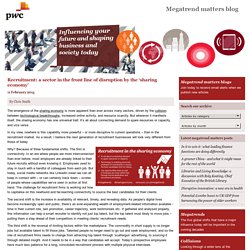
But wherever it manifests itself, the sharing economy has one universal trait: it’s all about connecting demand to spare resources or capacity, and vice versa. In my view, nowhere is this capability more powerful – or more disruptive to current operations – than in the recruitment market. As a result, I believe the next generation of recruitment businesses will look very different from those of today. Resources - Jobvite. Design and Innovation Trends 2015. Capital - Secret tweets, public fallout? Q: One of my direct reports has been posting political opinions on social media under a pseudonym.

While every citizen has a right to his or her convictions, making these views public might compromise our company's officially neutral position on politics. Furthermore, I question this employee's judgment, since he knows he's putting the firm in a difficult position. Social networking now key for recruiters, study finds. Social networking is now a key staff-sourcing tool that recruiters must utilise, according to the latest UK Staffing Trends Survey.
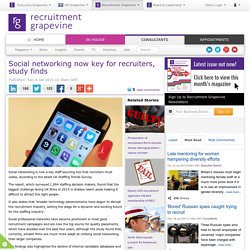
The report, which surveyed 1,994 staffing decision makers, found that the biggest challenge facing UK firms in 2015 is shallow talent pools making it difficult to attract the right people. It also states that ‘broader technology advancements have begun to disrupt the recruitment industry, setting the stage for a dynamic and exciting future for the staffing industry’. Social professional networks have become prominent in most good recruitment campaigns and are now the top source for quality placements, which have doubled over the past four years, although the study found that, currently, smaller firms are much more adept at utilising social networking than larger companies.
About 'Get Referred' - Accenture. HR directors need to up their game on data and social media. HR directors must focus on developing their skills in data, analytics and social media to “future-proof” their careers, according to research from Hays in association with the CIPD.

The report, The DNA of an ideal HR director, looks at the skills and capabilities that HR directors believe they must develop for ongoing career success, as economic recovery stabilises. It is based on a survey of 559 HR professionals in the UK and Ireland. At present, “the ideal HR director is able to understand business models and operations, and contribute to sustainable business plans”, the report says. But it predicts “a noticeable shift towards more externally focused capabilities” for HR directors over the next few years. This reflects the improving economic outlook, as organisations move from managing internal costs to building long-term sustainability via renewed recruitment and expansion activity.
Is creativity everywhere? The geography of the UK’s creative and high-tech economies. The UK’s economic future depends on the performance of its creative and high-tech economies.
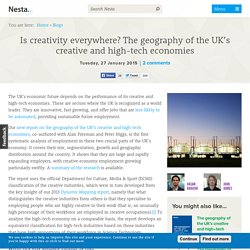
These are sectors where the UK is recognised as a world leader. They are innovative, fast growing, and offer jobs that are less likely to be automated, providing sustainable future employment. Our new report on the geography of the UK’s creative and high-tech economies, co-authored with Alan Freeman and Peter Higgs, is the first systematic analysis of employment in these two crucial parts of the UK’s economy. It covers their size, segmentation, growth and geographic distribution around the country. It shows that they are large and rapidly expanding employers, with creative economy employment growing particularly swiftly.
Major and fast growing sources of jobs The report finds that there were: Creative economy employment grew on average over three times faster than the workforce as a whole (4.3 per cent per annum (p.a.) vs (1.2 per cent p.a.) between 2011 and 2013. Fiat boss: Google and Apple may disrupt car industry. 3 March 2015Last updated at 11:40 ET By Russell Hotten Business reporter, Geneva Motor Show Google is developing a driverless car The traditional motor industry would be foolish to ignore moves by Google and Apple into car technology, said Fiat-Chrysler boss Sergio Marchionne.
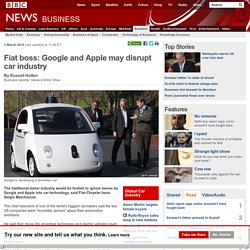
The chief executive of one of the world's biggest carmakers said the two US companies were "incredibly serious" about their automotive ambitions. He said their move into driverless technology and electric vehicles could be "disruptive" for manufacturers. Mr Marchionne commented on the tech giants' plans at the Geneva Motor Show. NCTJ%20Emerging%20Skills%20FINAL.
Creating the future of HR: A practical guide to embracing the digital and social imperative. Organisations must make a cultural shift to being ‘digital on the inside’.

By infusing and embedding digital throughout every aspect of the business, it is possible to create an enterprise-wide ‘digital ecosystem’ that includes people, processes and technologies and enables digital speed, collaboration and agility. Business leaders must embrace the imperative for their organisation to become digital ‘on the inside’ and ultimately drive a digital transformation programme that meets their strategic objectives and employee desires now and in the future. Our practical guide provides key insights to help business leaders:- Recruiter Hangout - How to market yourself on social media. New social media briefing launched - using social media in your recruitment process - NHS Employers. Access more information and download the briefing Our latest social media briefing Using social media in your recruitment process, an essential guide for NHS human resources (HR) directors and managers, explores how social media can support your recruitment process.
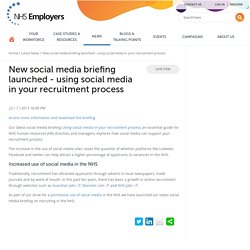
The increase in the use of social media sites raises the question of whether platforms like LinkedIn, Facebook and twitter can help attract a higher percentage of applicants to vacancies in the NHS. When worlds collide in cyberspace: How boundary work in online social networks impacts professional relationships. + Author Affiliations Correspondence: Nancy Rothbard, Email: nrothbard@wharton.upenn.edu As employees increasingly interact with their professional contacts on online social networks that are personal in nature, such as Facebook or Twitter, they are likely to experience a collision of their professional and personal identities that is unique to this new and expanding social space.
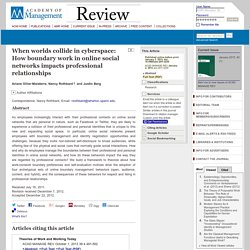
In particular, online social networks present employees with boundary management and identity negotiation opportunities and challenges, because they invite non-tailored self-disclosure to broad audiences, while offering few of the physical and social cues that normally guide social interactions. Why Social Media is Important in Screening Candidates. 8 rules to ensure Twitter doesn't get you sacked. The Value of Social Media For Recruiters. Hiring & Recruiting: Why I Never Post Job Openings. People often ask me how to get a job at my company, User Insight.
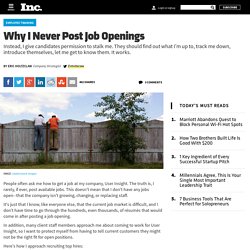
The truth is, I rarely, if ever, post available jobs. This doesn't mean that I don't have any jobs open--that the company isn't growing, changing, or replacing staff. It's just that I know, like everyone else, that the current job market is difficult, and I don't have time to go through the hundreds, even thousands, of résumés that would come in after posting a job opening. In addition, many client staff members approach me about coming to work for User Insight, so I want to protect myself from having to tell current customers they might not be the right fit for open positions. L'Oreal Asks their 300k LinkedIn Followers: Are You IN? Just after developing a new employer value proposition, our friends over at L’Oreal have been at it again. In celebration of reaching 300,000 followers on their LinkedIn company page, they launched a challenge to anyone with a LinkedIn account to share an ‘IN’ moment.
The ten best moments picked by L’Oreal will then be shared on the company page, which could lead to a nice bit of exposure to a job seeker for instance, given that hundreds of thousands followers could see the update. This is all hosted on a micro-site aptly named lorealareyouin.com where you log in with your LinkedIn account, then say why you are IN – picking reasons such as INspring, INsightful or INternational which I picked. You are then prompted to say why exactly this might be, to which I just had to answer “Because I’m Worth It”.
The end result? The idea here is fairly simple, by generating something visual from a person’s LinkedIn profile they will be inclined to share with their networks. Will the 'right to be forgotten' ruling affect candidate background checks? One of the most common forms of pre-employment screening is the internet search – trawling the web for information beyond the CV that aids the decision to progress or reject a job applicant. Most recruiters will probably admit to Googling applicants. It's pretty much standard practice these days. However, news that the European Court of Justice (ECJ) has ruled in favour of removing links to "inadequate, irrelevant, or excessive" information at the individual's request will surely have a bearing on what recruiters can find online. Requests granted under the "right to be forgotten" ruling will force Google, Bing et al to eradicate links so that the information doesn't appear on search results, remaining undiscoverable.
"Personal Social Networking: Affects on Companies Hiring Decisions" by Damaris Betances, Robert Solarczyk et al. Abstract The purpose of this exploratory study was to investigate the effects personal social networking sites had on candidate’s opportunities for obtaining employment and how and to what extent hiring managers used this information in the hiring process. Hiring managers across four industries: Retail, Banking, Healthcare and Hospitality were surveyed to learn how they are using social media sites to “screen” potential mid-level (and above) managers for their organizations. Additionally, the researchers wanted to determine what social media content was most influential in developing negative perception of the candidate. The results of the study showed contrasting results to prior studies which typically included samples of professional recruiters. As with many inventions, one typically leads to many others creating an even greater effect on a society.
When social networks cross boundaries. Going Digital: exploring 'Tech for Good' (with images, tweets) · nesta_uk. CharityComms. It’s no secret that digital presents many new opportunities for charities to connect with supporters, increase funds, promote awareness and raise profiles. But it also provides a number of new challenges too – from integrating your social media strategy across your organisation to collecting and analysing meaningful metrics. This event explored emerging trends, challenges and examples of innovation and best practice in digital communications. This event was sponsored by Chameleon - the digital experts for the charity sector. Resources. Future of News: News v Noise. Markham Nolan: How to separate fact and fiction online. 2014 Study impact of Social Media on News: more crowd-checking, less fact-checking. Econsultancy. Waterloo 'hire me' sign graduate returns to recruit. HR Grapevine - January 2015 digital edition.
Digital disruption: Six consumer trends and what businesses need to do now. Consumer behavior is rapidly changing, with “digital” activities growing rapidly in every sphere (see text box below). Reuters Institute Digital News Report. Digital disruption. The past decade has witnessed the most rapid technological change since the industrial revolution of the 18th century. BPI_Digital_Music_Nation_2013.PDF. Five Ways Digital Disruption Will Impact The Customer Experience. Pharma execs gear up for the digital revolution. 2014 has witnessed an important change in sentiment among pharma companies towards digital healthcare, according to research from consultants Arthur D Little. Nick de Cent reports. Although technology has always been a key driver of change in healthcare – think intelligent prosthetics and big data – digital medicine is set to transform the global healthcare industry in the coming years.
Digital health: A way for pharma companies to be more relevant in healthcare. Digital health: A way for pharma companies to be more relevant in healthcare. New survey casts light on the use of digital technology in arts and culture sector. A new report on the findings of a survey published today, called Digital Culture: How arts and cultural organisations in England use technology, gives detailed insights into the use of digital technologyⁱ within the arts and culture sector for the first time. The survey which was commissioned by the partners of the Digital R&D Fund for the Arts – Arts Council England, Nesta and Arts and Humanities Research Council – consulted with nearly 900 organisations from across the arts and culture sector in England. Digital_transformation_at_nike_20-12_pdf.pdf. The Economist explains: How technology could end illegal fishing. Siemens: Recruitment as a Key Strategic Advantage.
Accenture-Industrial-Internet-of-Things-Infographic-2015.pdf. Technology Vision 2014: IT Trends and Innovations. Why one NHS trust is experimenting with social media. How technology is changing the way we plan and experience events. Accenture Digital: Transforming Every Aspect of our Lives. D5 London 2014: leading digital governments. How to get a digital job in international development. Www.ukdigitalskills.com/wp-content/uploads/2014/07/Binder7-REDUCED2.pdf.